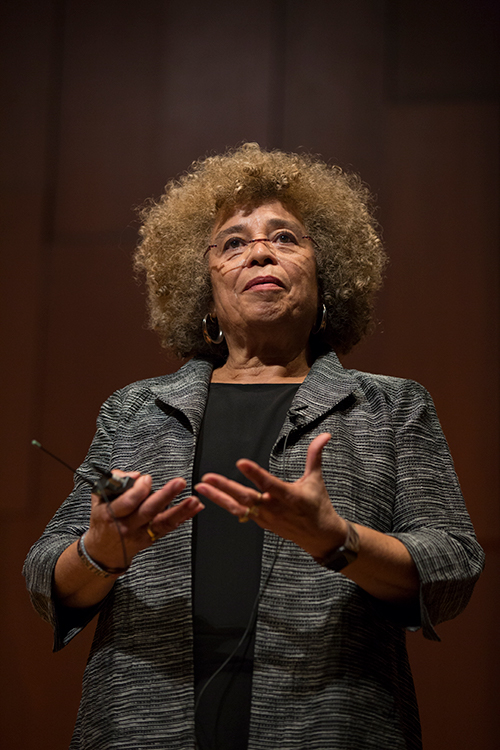PROVIDENCE, R.I. [Brown University] — Longtime social justice activist and scholar Angela Davis spoke to an overflow crowd at Brown University’s DeCiccio Family Auditorium on Friday, Feb. 10, delivering a hopeful message and encouraging young activists to build community in order to combat systemic racism and other injustices.
Though her lecture, “Freedom is a Constant Struggle,” was billed as a discussion of the prison industrial complex, Davis — true to form — spoke on a wide range of salient social and political issues, from President Donald Trump’s recent executive order on immigration to the protests against the Dakota Access Pipeline to Black Lives Matter, environmental justice and transgender rights. Her energetic audience frequently responded to her words with clapping, laughter and collective murmurs of agreement.
Davis repeatedly called the current moment in U.S. history “a dark period,” referring to Trump’s recent election — a shift in presidential power that Davis acknowledged many activists on the political left see as a huge setback in the fight for civil rights, an arena in which she has played a prominent role for decades. However, she also voiced her continued belief that there is hope for a more just world and that activists must continue to organize and mobilize to make it real.
“Sometimes the future that you imagined to be most dreadful turns out to be the future that compels you to reach down very deeply into your being to uncover reservoirs of strength and perseverance that you had no idea were there,” Davis said. “And you probably would not have discovered but for the disastrous times.”
 Throughout her talk, Davis continually returned to the theme of community — the idea that it is not single individuals but rather mass movements of people who have fought for and achieved civil rights during America’s history, particularly organized movements led by women, people of color, indigenous people and other marginalized communities.
Throughout her talk, Davis continually returned to the theme of community — the idea that it is not single individuals but rather mass movements of people who have fought for and achieved civil rights during America’s history, particularly organized movements led by women, people of color, indigenous people and other marginalized communities.
“Behind all of these major changes, we see mass movements. We see people coming together with courage and determination to say, ‘we will not stop until we achieve what we are fighting for,’ ” she told the audience. “During the coming period, our primary job will be to build community, to create community … in ways that allow us to understand that the work that we do now does matter, even if we cannot see in an immediate sense the consequences of the work we are doing. It will matter eventually.”
Davis highlighted the recent Women’s March on Washington, which brought more than 500,000 people to the nation’s capital to protest the current administration and rally around a progressive platform on issues ranging from racial profiling and environmental justice to immigrant and reproductive rights. Davis gave an impassioned speech at the march that gained a widespread audience via social media. At Brown on Friday, Davis celebrated the victory of this mass mobilization but critiqued the march for continuing to uphold racist power structures that forefront white women in movements against injustice.
“When we use the category ‘women,’ it is rarely, if ever, represented by a woman of color,” she said. “And I think that we will finally have initiated the process of conquering the linguistic and conceptual influences of racism when a poor black woman, whose emblem is “freedom is a constant struggle,” can serve as the metonym — can stand in for — the universal category ‘woman.’”
Toward the end of the evening, Davis spoke in more detail about her activism around the prison industrial complex, arguing that prisons do not rehabilitate but rather exacerbate racism, sexism and heterosexism in society at large and “prevent us from grappling with the complexities of the problems of our time.”
After a standing ovation at the end of the lecture — part of the Brown Center for Students of Color’s Black, Asian American, Latinx, Multiracial, Native American and Southwest Asian/North African Heritage Series — Davis took questions from the audience, first from local high school students from Providence and Central Falls, and then from Brown students. In response to a student who asked how to maintain hope in a world that is slow to change, Davis counseled students to pace themselves, to work toward a “sustainable activism” and to take advantage of the brief time they have in a university setting.
“This is the only time in your lives where the work that you’re doing is thinking and reading and discussing, and you have the opportunity at this historical moment to translate some of that into activism…” she said. “In order for your activism to be sustainable, you have to love doing it. You can’t just be doing it because you think that’s what you’re supposed to be doing. People get involved in movements and they are very intense and very exciting, and something is happening every day or every hour, but it doesn’t have to always be that way. We won’t survive if it’s always that way.”